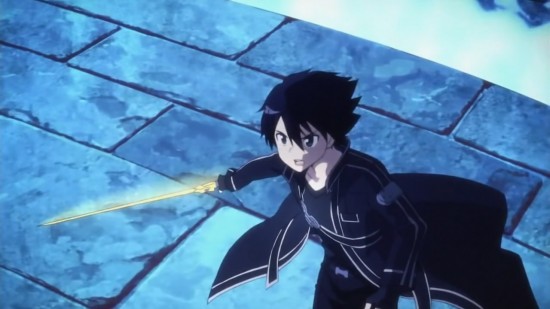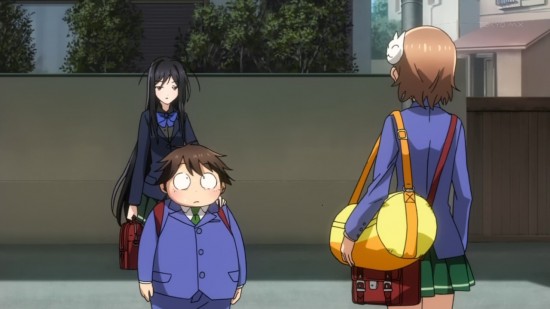In my last, very negative post about Sword Art Online I said “I find it hard to believe that this comes from the same author as Accel World.” Which raises a reasonable question. Both series are based on light novels by Reki Kawahara. Why is the writing quality so different?
Accel World isn’t Shakespeare but the writing is well above average for a fighting anime. It has interesting characters with some depth and complexity who experience real growth. Sword Art Online on the other hand feels like nothing so much as a work of fan fiction by a bright 14-year-old.

The biggest problem with SOA is the protagonist, Kirito, who is basically a male Mary Sue (or, if you prefer, a “Marty Stu”). He’s a mysterious loner who rides into town, defeats the monsters and rides off into the sunset as the maidens sigh. He’s so powerful that the fights, however beautifully animated, tend to lack dramatic tension because we know he can beat anyone and anything in a fair fight. He’s awkward with women but it doesn’t really matter–the cute girls seek him out because he’s just so totally awesome.
(Of course that’s just in the game world. He’s probably less impressive in the real world, but that doesn’t matter because we never see the real world.)

Compare this with Accel World. The hero, Haruyuki, is a short, overweight 13 year old boy. He has a talent for games but is a total loser in the real world, which is where most of the action takes place. However he meets a pretty girl who believes in him and is inspired to try to improve himself, not only as a gamer but in the real world as well.
Even the fights in the game world are much more dramatic since Haruyuki, though talented, is up against opponents who are older, more experienced and more ruthless.
Here’s an interesting question: If Haruyuki, particularly the initial loser Haruyuki, were to write a story, what would it be like? It would probably be something like Sword Art Online, complete with a highly idealized version of himself. He would lack the maturity and perspective to write something like Accel World.
So here’s a bit of speculation. I don’t have any biographical information on Reki Kawahara, but the English language SAO Wiki has a picture of him in which he appears to be in his early twenties. If that’s his age now then when the first volume of Sword Art Online was published in 2002 he would have been in his early teens. (Fans of Bakuman or Ore no Imouto will know that Japanese publishers do sometimes take a chance of promising teenage writers.) That would explain a lot.
When the first volume of Accel World was published in 2009 he would have been in his late teens or his early twenties. He would already have experienced some success as a writer of popular fiction. No doubt he would have found a girlfriend. At that point he would be in a position to write something like Accel World featuring a version of his younger self.
This theory makes me feel hopeful. Possibly later episodes of Sword Art Online, based on stories he wrote when he was older, may be better than the early episodes. In any case there’s good reason to hope for even better things from Reki Kawahara in the future.


The other side of the coin is, of course, that studios could be banking on the relative lack of depth in SAO to give it a broader appeal amongst teenaged males.
Escapism that shows you your flaws isn’t necessarily as well-recieved as flat escapism.
That seems a bit cynical. Lots of anime series manage to be escapist while still giving us characters with far more depth and complexity than SAO–and it doesn’t seem to hurt their popularity with young males.
I don’t believe the weak writing is actually a benefit to the series. On the other hand there must have been something about the original novels that made them popular enough to justify a high-budget anime adaptation. Not having read the novels I’m not in a position to say what it was. I suspect that if I could read Japanese well enough to tell good writing from bad I would find something promising in the novels in spite of their immaturity.